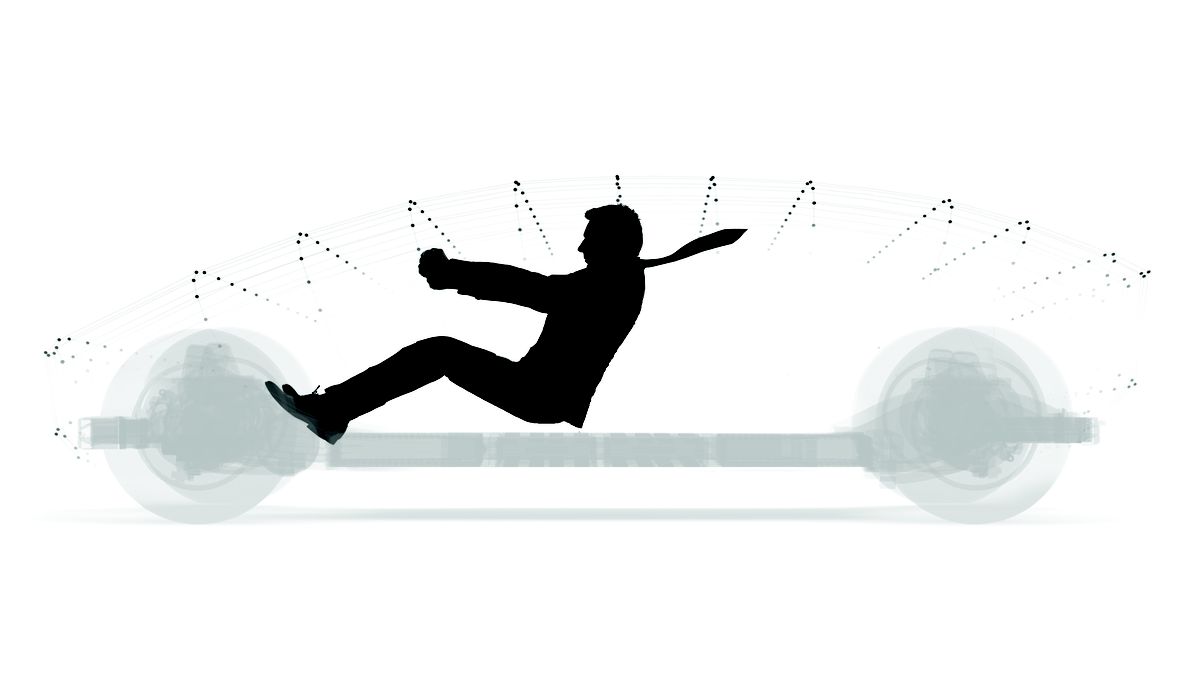Electric vehicle startup EVelozcity, which was founded in late 2017 by three former BMW executives (and ex-Faraday Future employees), has a new name and a new direction. The company announced Monday it’s rebranding to Canoo, and also clarified that it will only sell its upcoming vehicles on a subscription model. Those vehicles will be human-controlled at first, though the aim is to equip them with enough technology that they could eventually be autonomous.
The first car from Canoo is due in 2021, and it will be a “lifestyle vehicle” with a “minimalist design that maximizes interior space.” Though Canoo only showed off a rough diagram of the shape of the vehicle on Monday (seen above), the company says it will offer the interior space of a large SUV in the footprint of a compact car. The outline Canoo showed off looks something like a cross between Volkswagen’s resurrected VW Bus and the autonomous pods that have been slowly rolling around in small communities and on some public roads.
Canoo plans to build three other cars all on the same “skateboard” platform of battery pack and electric drivetrain. It showed off the outline of one that more closely resembles the shape of a traditional car, which it calls the “personal commuter vehicle.” Canoo also plans to make a dedicated ride-hailing vehicle and one suited for delivery by constructing different “cabins” that can be dropped onto the universal skateboard. Previously, the company has said it is aiming to build vehicles that ultimately cost between around $35,000 to $50,000.
:no_upscale()/cdn.vox-cdn.com/uploads/chorus_asset/file/15984285/Commuter_copy.jpg)
Canoo isn’t sharing specific pricing plans for its vehicles just yet, but CEO Stefan Krause tells The Verge the subscriptions will be really flexible. “There will be no set date. You could take it for one month or take it for 10 years,” he says. “We are basically completely open ended. I want customers to try it, and after two months they decide it’s not for them, then they just return the car.” Customers would have to forfeit an annual fee that covers administrative expenses and the on-boarding process, Krause says, but he adds that wouldn’t be “as much as you would lose if you left a lease after two months.”
EVelozcity was born in late 2017 after Krause, who was an executive at BMW and Deutsche Bank, left EV startup Faraday Future amidst an ugly public spat. Krause had been hired on as CFO to help the China-backed California automaker reign in its unruly finances, but founder Jia Yueting rejected most of his suggestions, one of which involved filing for Chapter 11 bankruptcy, as was reported by Jalopnik and The Verge at the time.
When Krause ultimately walked away, fellow former BMW executive Ulrich Kranz decided to join him in leaving Faraday Future. Jia then issued a polemic press release accusing the duo of “malfeasance and dereliction of duty,” and vowed to take legal action. Kranz’s former designer on the i8 and i3 programs at BMW left Faraday Future a few weeks later. Soon after, the trio formed EVelozcity. Faraday Future eventually sued EVelozcity in early 2018 for allegedly building the company on stolen employees and intellectual property, but the lawsuit was ultimately settled.
Headquartered in Los Angeles, California, Canoo wants to sell its cars in both the US and China. It’s already hired around 350 employees, with most in the US. While recent reports said Magna might build Canoo’s cars, the company says it is still talking to several manufacturers in both the US and China.
Krause says his team considered around 400 names for the rebrand, but claimed in a statement that they ultimately went with Canoo because “it sounds distinctive, looks cool and creates a feeling of both relaxation and movement,” and that, “for thousands of years, a canoe has been a simple, sustainable transportation device used all over the world.”
